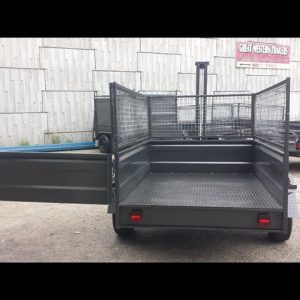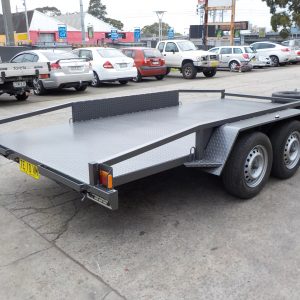Tipper trailers are specialized vehicles used to transport heavy duty materials. It is also used to unload bulk materials like sand, gravel, demolition waste, and agricultural products.
Other vital features include a hydraulic lift system that tilts the trailer bed, allowing the contents to be easily dumped out without manual labor.
Top 4 features of tipper trailers
- Tipper ones come in various sizes and configurations, including side tippers and end tippers, each designed for specific tasks and load types.
- They are widely used in industries such as construction, mining, landscaping, and agriculture due to their efficiency in handling large volumes of materials.
- Easy to attach to trucks or other towing vehicles, tipper trailers enhance productivity by reducing the time and effort required for unloading.
- Their robust construction and versatility make them a valuable asset for businesses that need to move heavy loads frequently and efficiently.
What are the different types of tipper trailers?
Here is a note on the different type tipper trailers:
End Tippers
End tippers, are the most widely used type in Australia. The other name for this trailer is rear tippers. An important feature of this tipper trailers include a hydraulic system that lifts the front of the trailer bed, allowing the material to be dumped out the back. These are simple and show effectiveness in handling bulk materials like sand, gravel, and demolition waste. They are particularly favored in the construction industry for their ease of use and ability to handle heavy loads.
Side Tippers
Side tippers are another common type in Australia. This type of trailer is widely used in agriculture and mining industry. These trailers have a hydraulic mechanism that tilts the trailer bed to one side, allowing materials to be unloaded quickly and efficiently.
Side tippers are beneficial when space is limited, as they can unload alongside the trailer without requiring much maneuvering. These tipper trailers are ideal for transporting bulk goods such as grain, sugar cane, and minerals.
Belly Dump Trailers
Belly dump trailers feature a unique design where the trailer bed has a bottom opening. It is also commonly called bottom dump trailers. This opening is controlled by a hydraulic system, allowing materials to be discharged directly beneath the trailer.
It is primarily used for spreading materials over a wide area, such as laying gravel on roads or distributing soil on large agricultural fields. Their design facilitates quick unloading and precise placement of materials.
Road Train Combinations
In the expansive terrains of Australia, road-train combinations are also prevalent. These setups typically involve multiple tippers linked together, maximizing the hauling capacity.
End tippers and side tippers can be part of these combinations, enhancing their versatility for long-haul transport across remote areas.
Are looking for Tipping trailer for sale near me? Before making the purpose, why not find out the uses of such trailers.
Top 5 Uses of Tipper Trailers
In this blog section, we shall take a look at how tipper trailers are useful in many industries and processes.
1. Construction industry
The construction industry cannot function without a proper transportation system. It needs to transport construction materials like sand, gravel, and cement from one point to another. Across Australia, using tipper type trailers is common.
Without it, the construction process will come will not go as smoothly. From removing debris to bring in necessary construction equipment, this tipper is making construction industry function to its optimum.
Before we proceed further in this blog, if you are also interested in finding out about car trailers read here- Car Trailers
2. Mining and Quarrying Sites
Alongside the construction industry, the mining and quarrying industry is also dependent on tipper trailers for transportation purposes. Without this, the minerals, aggregates and ores will not be transported from one place to another.
These trailers are vital for hauling bulk commodities like coal, iron ore, limestone, and gold from mines to processing plants or ports for export.
Since, these trailers have a strong built, the heavy duty products at the mining and quarrying sites become easy to carry.
3. Agricultural Industry
These trailers play a vital role in the agricultural industry. It is increasingly helping in transporting the harvested crops, livestock feed, fertilizers, and agricultural equipment. Bulk agricultural produce are moved around in this trailer. Farmers massively depend on it.
4. Waste Management
Tipper trailers play a crucial role in waste management operations. It helps in transporting the municipal waste, construction debris, recyclable materials to landfill sites, recycling facilities, or transfer stations.
Without it efficient collection and disposal of the waste will become troublesome, plus environmentally unsustainable.
5. Maintenance of Infrastructure
Major activities like road repairs, site remediation and road repairs are heavily dependent on tripper type trailers. Materials like asphalt, sand and gravel are transported using this, thereby making the maintenance work easy to carry out.
For more on Tipper trailers, feel free contact Great Western Trailers.

